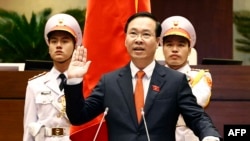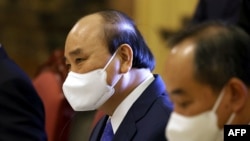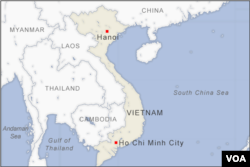Vietnamese residents interviewed by VOA in recent days have expressed doubt that the current crackdown on scandals here will solve the country’s problems.
Former President Nguyen Xuan Phuc resigned in January in the wake of a series of corruption scandals involving his subordinates and their handling of the COVID-19 pandemic. Allegations have included accusations that officials have extorted about $200 million from expatriate Vietnamese trying to return home during the pandemic and proceedings have been launched against more than 100 people linked to a $172 million scandal involving Viet A Technology Company. Officials were allegedly bribed to supply hospitals with overpriced test kits.
At the time of Phuc’s resignation, indications were that he had been forced out of office. Meanwhile, the country’s anti-corruption drive has been expected to continue after his resignation.
There are questions about the transparency of the government and removal of Phuc and other prominent officials, as indicated by the government’s censorship of reporting on his Feb. 4 farewell ceremony, during which he handed power over to acting President Vo Thi Anh Xuan. Vo Van Thuong, a permanent member of the of the Central Committee’s Secretariat, who has now been elected to succeed Phuc, was seen hugging Phuc.
However, not all developments from the ceremony were fully reported by the press. Vietnamese media outlets were told to remove one of Phuc’s remarks in which he attempted to deny allegations he had been ousted because of the Viet A scandal.
“My family, my wife, and my children have neither been seeking self-interests nor corrupted relating to Viet A. They have never met Viet A’s general director [Phan Quoc Viet],” he said in the quote which would be removed.
Phuc’s statement implied that he did not leave office voluntarily. There is widespread dissatisfaction in Vietnam with the way the COVID-19 pandemic was handled by the leadership, which included Phuc as prime minister at the time. Some, however, believe that he was removed for political reasons and that the Viet A scandal is being used as an excuse.
The incident prompted the public to question the transparency of Vietnamese authorities. While investigation and anti-corruption moves are seen as necessary, signs of infighting behind the scenes do not persuade many people that this is the right way to solve the problem from the root.
Many in Vietnam agree that the investigation into the Viet A COVID-19 test kit scandal that led to the removal of the president and two deputy prime ministers earlier is justified.
Tran Van B., a shop owner in Ho Chi Minh City, criticized the “personal branding” efforts of the officials, referring to officials’ self-promotion, using the pandemic to build their reputations.
“They deserve to leave office. There should have been many others. And they must all be held accountable and need to publicly apologize for the entire disaster they caused during the outbreaks,” he said.
“That disaster resulted from the wrong strategy of dealing with the pandemic and their stubbornness in carrying out this mistake to the end, despite how much useful and scientific information was available from other countries,” he said.
“The political discourses during the pandemic also showed that they turned the pandemic into an opportunity to display their political prestige,” he said.
He was not alone in criticizing officials.
“Being president means you need to take care of your people, you need to be tough to deal with everything,” said Ho Chi Minh City resident Nguyen Nam.
“Vietnam has so many problems right now, not to mention tensions out there at the sea. People need to have a comfortable life. When people are poor, the country can’t be strong. We’re behind others on many things. The people are being intimidated, and we dare not speak up. If we speak up, we’ll get arrested. So nobody dares speak,” he said.
For An An, an office worker in Hanoi, the corruption or theft of relief money – not just during the pandemic – has been continually exposed in natural disasters or floods for many years.
“Public trust has been declining in officials and government. The crackdowns on big corruption cases and wrongdoings of high-ranking officials are now creating a positive sentiment for the people, restoring some confidence in the public,” he told VOA.
Others expressed dissatisfaction with the government to VOA.
“As far as I’m concerned, people have not been happy with our leaders, the recent prime ministers, presidents ... their actions just don’t match their words,” war veteran Tran Thanh said.
“I have no faith in this regime. I have no confidence left even if there’s something good about it. It’s just too late,” said former Communist Youth Union officer Tang Thanh.
An An said he supports the anti-corruption campaign. He argued that recent developments may initially bring a little concern about political instability and changes in the policies of the successors, but the impact of this senior personnel change poses no threat to investors, given that the Communist Party acts on the principle of consensus.
“On the contrary, in the long run, a cleaner and more transparent government will be a plus point to attract foreign investment,” said the 34-year-old, who used to work for foreign companies.
In fact, the anti-corruption campaign has contributed to increasing Vietnam's ranking in international anti-corruption rankings. According to the Transparency International’s Corruption Perceptions Index 2022, Vietnam was increased by three points to 42 points, ranked 77th, Vietnam’s highest score since 2012.
However, some worry that the anti-corruption campaign, led by Party General Secretary Nguyen Phu Trong, cannot change the nature of the problem.
Lam Kieu Loan, in Hanoi, who previously worked in the medical equipment industry, said that the Viet A case is like “an appeasement of public opinion and is just one of many issues.
“It is more like internal cleansing than taking action against corruption because it only focuses on a case that people know and pay much attention to. Yes, they deserve to be ousted, but just blaming one case is not enough,” she said.
Loan argued that the anti-corruption campaign causes more chaos.
“Indeed, many people stood up to tell the truth and were punished before these removals. However, this case looks like the factions annihilate each other, and escape justice rather than actually investigate and tackle corruption. Focusing public opinion on one incident also creates many blind spots for other issues that need to be clarified,” she added.
For those who support the political system or work for it – including the party, the state, or party- and government-affiliated organizations – this is an event of great significance demonstrating the determination to perfect and clean up the system, helping to protect the long-term sustainability of this political institution, according to Tran Van B.
“It proves that the fundamental flaws of this system can be patched,” he said.
However, he added, “for those who disagree with the system, this is just another demonstration that this centralized system is incapable of fixing its inherent fundamental flaws in order to thrive. It is an uncontrolled concentration of power. … The ‘noisy’ fight against corruption, ‘dot lo,’ [“blazing furnace,” Vietnam’s anticorruption campaign] for many years was no help in the end. The powerful factions rise again whenever their chance arises.”
VOA's Vietnamese Service contributed to this report.







